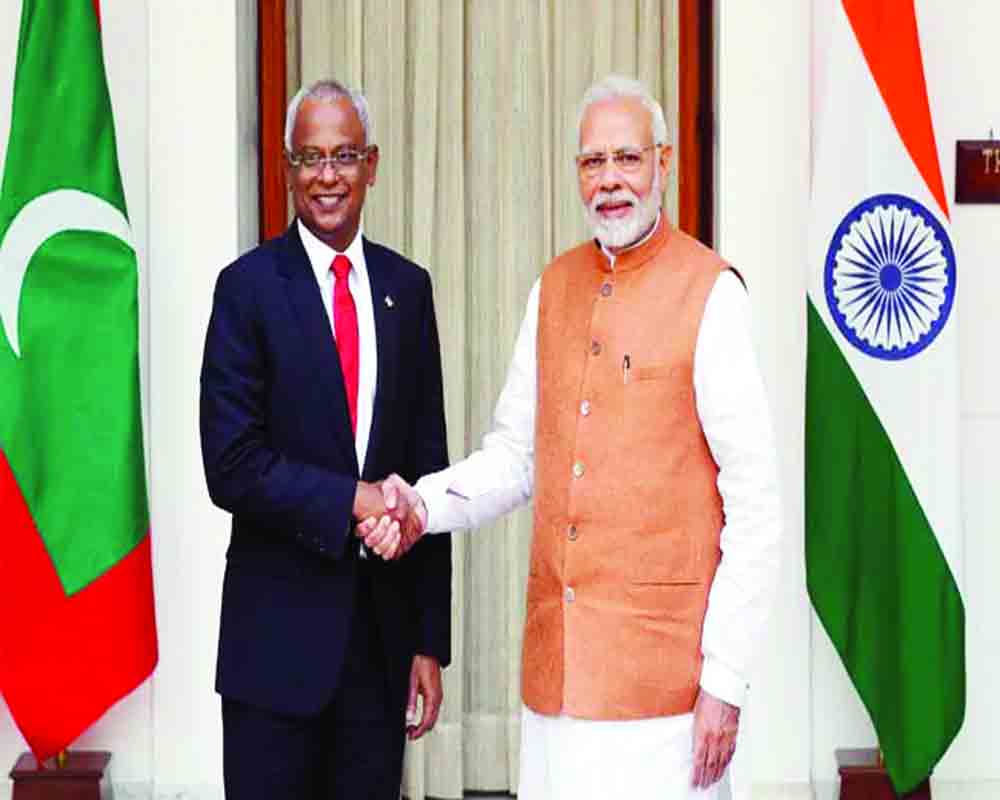Politically and historically, India has always been a steadfast ally of the Maldives. At home or at global platforms, India selflessly watches its back
The archipelagic nation of Maldives has witnessed tectonic undercurrents of geopolitical one-upmanship and unrest, which belie its idyllic perceptions. India’s historically benign and non-expansionist outlook ensured that the semi-autocratic 30-year reign of Maumoon Abdul Gayoom and the subsequent, democratically elected Government of Mohamed Nasheed’s Maldivian Democratic Party (MDP) retained a pro-India tilt. In 1988, India famously quelled a roguish coup with the dramatic landing of its Parachute Regiment elements after flying 2,000 km non-stop in ‘Operation Cactus’. India’s predominant impulse then was to deter the intervention of any other foreign power in India’s backyard === it was portents of such a dangerous drift that ensued with the election of Yameen Abdul Gayoom’s Progressive Party of Maldives (PPM) from November 2013-November 2018. Yameen’s five-year tenure saw signature moves of President Xi Jinping’s aggressive Chinese inroads with a slew of investments (Belt and Road Initiative), free trade agreements and murmurs of a Chinese military base. India’s strategic sphere of influence was openly threatened with the Chinese conglomerates replacing Indian entities. The lure for the Chinese was the strategic encirclement of its regional nemesis, India, with its strategy of “String of Pearls” ports.
The traditional “India first” policy was duly restored in November 2018 with the return of President Ibrahim Mohamed Solih’s MDP. India reciprocated with its “Neighbourhood First” policy — soon a record $1.3 billion financial package was announced, including the largest civilian infrastructure project connecting Male with three islands. The days of the unprecedented “India out” campaign unleashed by the previous Yameen dispensation are over for now. Maldives also became the first country, along with Bhutan, under the “Vaccine Maitri” diplomacy to receive COVID vaccines. Former President and current Speaker Mohamed Nasheed was quick to acknowledge: “During tsunami, the 1988 coup, water crisis or Corona, India has been our first responder and dependable friend.” This natural bonhomie was sought to be strengthened when India announced its support towards the candidature of Maldivian Foreign Minister, Abdulla Shahid, towards the UNGA presidentship in December, much before the alternative candidature of another pro-India candidate, Afghan Foreign Minister Zalmai Rassoul, was announced.
As amongst the highest offices in the UN system, the victory of Maldivian Foreign Minister is especially sweet for India after the biased and overtly political tenure of the previous UNGA president, Turkish diplomat Volkan Bozkir. In an unprecedented move whilst in Pakistani, Bozkir had recklessly conjoined the issues of Palestine and Kashmir and urged Pakistan: “I think it is the duty, especially Pakistan’s, to bring this issue (Kashmir) to the UN platform more strongly!” Bozkir lost all sense of proportion, propriety and even diplomatic pretence when he alluded to the ostensible “changed status” of Kashmir: “Throughout my term, and consistent with the UN policy, and applicable UNSC resolutions, I have encouraged all parties to refrain from changing the status of the disputed territory.” Bozkir was soon conferred with the second highest Pakistani civilian award, Hilal-e-Pakistan (third continuous Turkish recipient in three years), reflecting Islamist Recep Erdogan’s growing stranglehold over Islamabad.
Now, with Maldivian Abdulla Shahid’s one-year tenure, Delhi can expect a fair and friendly incumbent in the office. In a sign of times, Shahid appointed India’s Deputy Permanent Representative to the UN, Ambassador K Nagaraj Naidu, as his Chef de Cabinet. Though the one-year tenure may not allow any radical changes to the framework of the UN, India’s External Affairs Minister S Jaishankar alluded to the directional reset when he stated: “We look forward to working with him to strengthen multilateralism and its much-needed reforms” — the euphemism for India’s justifiable quest for a permanent seat in the UNSC is barely masked. China’s nefarious role in stymieing actions in favour of India is well documented. In this crucial tenure, India will have the opportunity to up the chorus of its preferred changes, just like Erdogan used the UNGA platform to play his own realpolitik to the occasional discomfiture of India during Bozkir’s tenure. Coinciding as it does with India’s two-year term as a nonpermanent member of the UNSC, the task is cut out for Indian diplomatic mandarins.
India will need to uptick and retrieve its diminished lustre among its once-friendly neighbours like Nepal, Sri Lanka and Myanmar (as done for Maldives), correct undeniable perceptions of its pandemic mismanagement and the growing concerns on its democratic liberties and freedom, for which it was always famed. The chessboard of diplomacy is forever changing, and Delhi must seize these serendipitously aligned circumstances to further its diplomacy. Maldives had a brief dalliance with the expansionist Chinese experience, as did Nepal (interference in Communist Government and landgrab), Sri Lanka (Hambantota takeover) and Bhutan (Doklam); the consequential difference vis-à-vis India needs to be gently asserted.
(The writer, a military veteran, is a former Lt Governor of Andaman & Nicobar Islands and Puducherry. The views expressed are personal.)
























